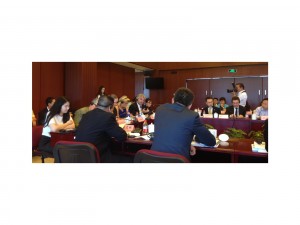OECD has an ongoing project to support China’s reform of stateowned companies and to promote responsible business conduct (RBC) in China. Many multinational companies from OECD-countries, including Norway, have business activities and relationships in China, and the OECD Guidelines are relevant for them and Chinese businesses even though China is not an OECD-member.
The purpose of this workshop in China in the end of May was to exchange experiences and share information with Chinese authorities, businesses and other stakeholders that work on responsible business. The National Contact Points (NCPs) established through the OECD Guidelines, are important in that respect, and several NCPs, including the new Chair of NCP Norway, Ola Mestad, participated in the workshop. They told about their work on promoting RBC and resolving issues/complaints through good offices and mediation. The workshop can be seen as a contribution towards strengtehened functional equivalence amongst the NCPs. The workshop was also useful with regards to questions related to a future adherence by China to the OECD Guidelines. 
The workshop in Beijing was constructive and well-organized, with representatives from Chinese authorities and businesses. They showed a great interest for the OECD Guidelines and in his presentation, NCP Norway Chair Ola Mestad, focused on how Norway has organized its NCP as a politically and in substance independent body from government with experts nominated by civil society, business and trade unions. He also mentioned that Norwegian authorities were working on ensuring consistency in the application of the OECD Guidelines in both private and public sector.
Mestad informed that the Norwegian state has more state-owned enterprises than many other OECD-countries, and that the OECD Guidelines are referred to in the mandate of the The Norwegian Sovereign Wealth Fund and in government ownership policies for state-owned enterprises. The state, as owner, expects that its companies actively and systematically work to fulfill their obligations within the field of corporate social responsibility/responsible business conduct, and Norwegian authorities follow-up this through dialogue with the companies. In that way they try to prevent that the companies contribute to violations of human rights, labour rights or take part in corruption or environmentally harmful activities. Mestad underlined that the Norwegoan government also expects such responsible business conduct from privately owned businesses.
Through the two days in Beijing, Chinese authorities and businesses were also informed of the importance responsible business conduct is for sustainable development; how the OECD Guidelines can be promoted and made more visible. The participants had active discussions and worked with case studies. Chinese authorities and businesses were particularly interested in what effect a Chinese adherence to the OECD Guidelines would have for Chinese businesses when they invested in other countries. The workshop concluded with an agreement that the dialogue between the OECD, OECD countries and China should continue with an emphasis on increased co-operation, sharing of information and experiences. NCP Norway appreciates the invitation to take part in this event and looks forward to seeing how the cooperation can be moved forward.
Read more about the workhop at OECD ‘s website.
